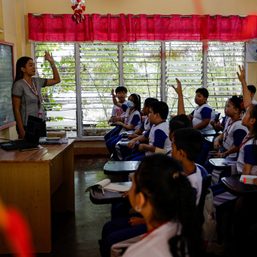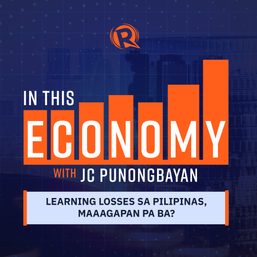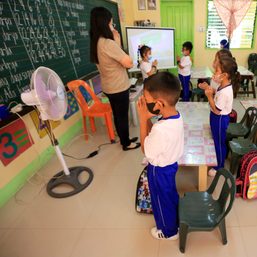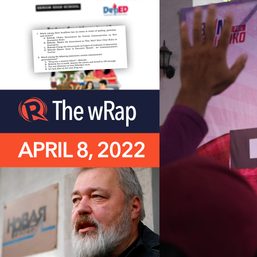SUMMARY
This is AI generated summarization, which may have errors. For context, always refer to the full article.
Citing its expensive cost and negative impact to the environment, Education Secretary Leonor Briones hopes schools will eventually “reduce dependence” on modular learning as the country shifts to distance learning approach during the pandemic.
“May implikasyon ang dependence sa modular learning dahil baka uubusin natin ang mga puno natin sa kaka-produce [ng learning modules]. ‘Yung demand for paper [is high]... malaki ang effect sa environment,” Briones said in a virtual press briefing on Wednesday, September 9.
(Dependence on modular learning has implications because we might cut down all the trees so we could produce learning modules. The demand for paper is high… there would be a big effect on the environment.)
Briones added, “In the long run, modular is really expensive.”
Briones, however, noted modular learning is the preferred mode of parents and students for the distance learning since access to technology and connectivity remains a problem for most of them. (READ: 8.8 million parents prefer modular learning for students – DepEd)
“We have to recognize na ito ay ang pangangailangan natin pero hindi ito ang (that this is what we need now, but it’s not the) permanent situation,” Briones said, adding they hope to gradually move online.
Briones said that Filipino students will be left behind in terms of global competitiveness as neighboring countries are using online technology for their remote classes.
“Sa competitive stance natin in neighboring countries – jobs – nakakatulong talaga na may exposure ka sa online at saka technology,” Briones said. (In terms of our competitive stance in neighboring countries – jobs – exposure to online technology would help.)
During Wednesday’s briefing, DepEd Regional Director Malcolm Garma said that Metro Manila schools are exploring the “many possibility of partnership” so they could transition from the use of printed modules to a “more digital platform [of] learning modality.”
“We’re hoping Madam Secretary that by the 3rd or 4th grading of this school year the National Capital Region would drastically reduce the use of printed modules,” Garma said in a mix of English and Filipino.
Local governments in Metro Manila – such as Pasig, Manila, and Quezon City – pledged to give their students and teachers gadgets for distance learning. (READ: Vico Sotto says Pasig raised P1.2 billion for students’ tablets, laptops)
‘Expensive’ modular learning
Modular learning is the “backbone” of the DepEd’s distance learning. Other modes of learning such as online, and TV and radio broadcasts would supplement the modules. (READ: Is it safe? Teachers fear exposure to coronavirus in modular learning setup)
The printing of modules was supposedly the reason why the school opening was postponed yet again. There had been reports that some teachers didn’t have copies of the modules weeks before the original date of the school opening.
DepEd earlier said that insufficient budget and supplies of bond paper contributed to the delay in the printing of learning materials.
While schools have a budget allocation for the shift to distance learning filed under school maintenance and other operating expenses (MOOE), teachers said this budget can be easily depleted due to the sheer number of modules that need to be printed.
Teachers from public schools took it upon themselves to launch donation drives to raise funds for bond paper and printers. (READ: Help! These schools need bond paper, printers for students’ learning modules)
Senator Ralph Recto, an economist, estimated the DepEd would need to print 93.6 billion pages of learning modules for some 21 million public school students for one full academic year.
Recto’s 93.6 billion pages estimate for the modules was pegged at just 80% of DepEd enrollees needing printed materials, with the rest getting these online. He made his estimations based on 20 pages per subject a week, 8 subjects, for 34 weeks, to be used by 17.206 million public school students out of the 21.507 million public students enrolled.
Whether the total cost is P48 billion, or P96 billion, or P117 billion, what funds DepEd has at the moment will not be enough, Recto warned.
DepEd said that it has realigned its 2020 budget to fund distance learning, while actual contributions from Special Education Funds (SEF) of local government units and from Brigada Eskwela had considered in the provision of funds to cover learning resources.
The government has allocated P606.5 billion of its proposed P4.5 trillion budget for 2021 to DepEd. (READ: Proposed P4.5-trillion 2021 budget goes to Congress)
While the education sector would receive the lion’s share of funds, several groups believe the amount is still not enough to cover the needs of the education sector for the overhauled education system. (READ: [ANALYSIS] Why you should be alarmed by Duterte’s 2021 budget)
Public schools are set to open on October 5. – Rappler.com
Add a comment
How does this make you feel?
![[The Slingshot] Red zipper on the mouth of Sara Duterte](https://www.rappler.com/tachyon/2024/04/TL-red-zipper-sara-duterte-april-12-2024.jpg?resize=257%2C257&crop=335px%2C0px%2C720px%2C720px)

![[OPINION] How about setting up a heat health warning system in PH schools?](https://www.rappler.com/tachyon/2024/04/heat-health-warning-system-in-PH-schools.jpg?resize=257%2C257&crop_strategy=attention)

![[ANALYSIS] The multiplier effect of negligence in education](https://www.rappler.com/tachyon/2024/04/The-multiplier-effect-of-negligence-in-education.jpg?resize=257%2C257&crop=277px%2C0px%2C720px%2C720px)


![[EDITORIAL] Ano sana ang takeaway ni Sara Duterte sa firesale ng mga laptops?](https://www.rappler.com/tachyon/2023/05/animated-DEPED-laptop-fiasco-carousel.jpg?resize=257%2C257&crop_strategy=attention)


There are no comments yet. Add your comment to start the conversation.